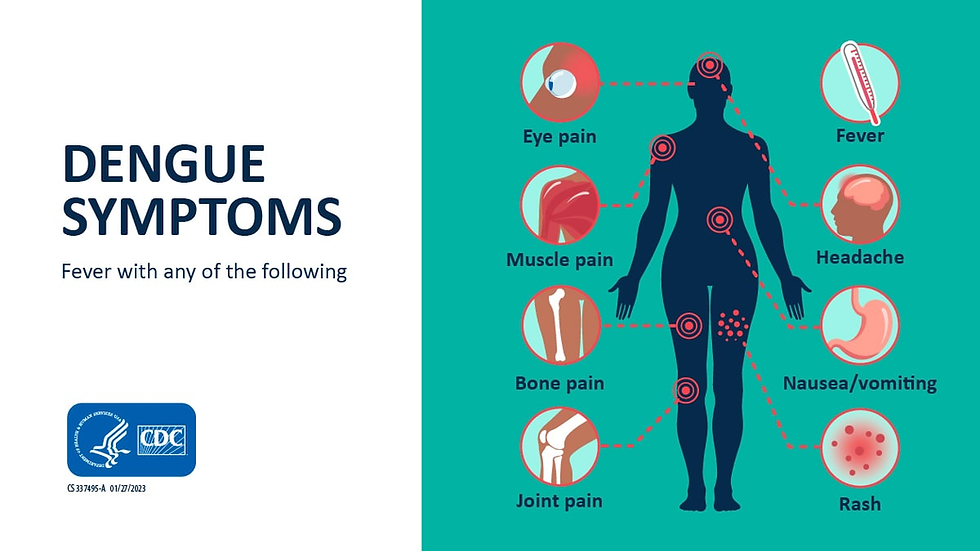Dengue Fever: keeping safe
- Paula Robertson
- Jul 8, 2024
- 3 min read
Dengue season is here...tips on keeping little ones safe

What is Dengue Fever?
Dengue fever is caused by the dengue virus, which is transmitted by Aedes mosquitoes, especially Aedes aegypti. These mosquitoes are most active during the early morning and late afternoon. The disease manifests in two forms: dengue fever and dengue hemorrhagic fever, the latter being more dangerous. This year, the dengue virus has been surging worldwide, helped by climate change. In barely six months, countries in the Americas have already broken calendar year records for dengue cases. The World Health Organization declared an emergency in December last year, and earlier this month U.S. health officials warned doctors to be alert for dengue cases as the tropical disease breaks international records.
Symptoms of Dengue Fever
Dengue fever symptoms typically appear 4-10 days after being bitten by an infected mosquito. The common signs include:
High Fever: Sudden onset of high fever (up to 104°F or 40°C).
Severe Headache: Intense pain behind the eyes.
Joint and Muscle Pain: Often referred to as "breakbone fever" due to severe joint and muscle pain.
Rash: A rash that may appear a couple of days after the fever begins.
Nausea and Vomiting: Common digestive symptoms.
Fatigue: Extreme tiredness and weakness.
(Common dengue symptoms. Source: CDC)
Red Flags: When to Seek Immediate Medical Attention
While many cases of dengue fever can be managed at home with supportive care, severe dengue is a medical emergency. Look out for the following warning signs, especially in the critical phase (days 3-7 of illness):
Persistent Vomiting: Inability to keep fluids down.
Severe Abdominal Pain: Intense pain that doesn’t subside.
Bleeding: Nosebleeds, gum bleeding, or easy bruising.
Difficulty Breathing: Shortness of breath or rapid breathing.
Restlessness or Drowsiness: Altered mental status, confusion, or extreme lethargy.
Cold or Clammy Skin: Indicating shock.
Practical Tips for Parents:
Prevention:
Avoid Mosquito Bites:
Eliminate Breeding Sites:
Regularly empty and clean containers that hold water, such as flower pots, buckets and tanks.
Ensure proper disposal of old tires and other items that can collect water.
Contact the relevant Regional Corporation to clear any clogged drains or mosquito breeding grounds.
Managing Dengue at Home:
Hydration:
Encourage your child to drink plenty of fluids, such as water, oral rehydration solutions, or clear soups.
Rest:
Ensure your child gets ample rest to help their body fight the infection.
Fever Management:
Use paracetamol to reduce fever and relieve pain.
Avoid aspirin and medications like ibuprofen as they can increase the risk of bleeding.
Monitoring:
Keep a close watch on your child's symptoms, especially during the critical phase.
Maintain a symptom diary to track fever patterns, fluid intake, and any red flags.
Prevention of dengue fever is the best strategy, but recognizing the signs and knowing when to seek medical help are equally crucial. By staying informed and prepared, you can ensure the best possible care for your child. Stay safe and proactive!
Be well,
Paula

Dr Paula Robertson is a busy mom and a paediatrician with over twenty years' experience working with young people and their families. She is also a certified children's mindfulness teacher and Positive Discipline Parenting
coach. You can find out more at www.paulathedoctormom.com.
Our AI wellness assistant has contributed to the writing of this article.

Comentários